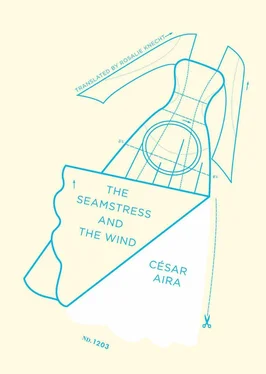César Aira
The Seamstress and the Wind
THESE LAST WEEKS, since before coming to Paris, I’ve been looking for a plot for the novel I want to write: a novel of successive adventures, full of anomalies and inventions. Until now nothing occurred to me, except the title, which I’ve had for years and which I cling to with blank obstinacy: “The Seamstress and the Wind.” The heroine has to be a seamstress, at a time when there were seamstresses. . and the wind her antagonist, she sedentary, he a traveler, or the other way around: the art a traveler, the turbulence fixed. She the adventure, he the thread of the adventures. . It could be anything, and in fact it must be anything, any whim, or all of them, if they begin transforming into one another. . For once I want to allow myself every liberty, even the most improbable. . Although the most improbable, I should admit, is that this plan will work. The gusts of the imagination do not carry one away except when one has not asked for it, or better: when one has asked for the opposite. And then there is the question of finding a good plot.
Anyway, last night, this morning, at dawn, still half asleep, or more asleep than I thought I was, a subject occurred to me — rich, complex, unexpected. Not all of it, just the beginning, but that was just what I needed, what I had been waiting for. The character was a man, which wasn’t a problem because I could make him the seamstress’s husband. . However, when I woke up I had forgotten it. I only remembered that I had had it, and it was good, and now I didn’t have it. In those cases it’s not worth the trouble to wrack your brain, I know from experience, because nothing comes back, maybe because there is nothing, there never was anything, except the perfectly gratuitous sensation that there had been something. . Still, the sensation is not complete; a vague little trace remains, in which I hope there is a loose end that I could pull and pull. . although then, to go on with the metaphor, pulling on that strand would erase the embroidered figure and I would be left with a meaningless white thread between my fingers. It’s about. . let me see if I can put it in a few sentences: A man has a very precise and detailed premonition of three or four events that will happen in the immediate future all linked together. Not events which will happen to him, but to three or four neighbors, out in the country. He enters a state of accelerated movement to make use of his information: speed is necessary because the efficacy of the trick is in arriving on time, at the point at which the events coincide. . He runs from one house to another like a billiard ball bouncing on the pampas. . I get this far. I see nothing more. Actually, the thing I see least is the novelistic merit of this subject. I’m sure in the dream all that senseless agitation came wrapped in a precise and admirable mechanism, but now I don’t know what that was. The key to the code has been erased. Or is that what I should provide myself, with my deliberate work? If so, the dream doesn’t have the least use, and it leaves me as unequipped as before, or more so. But I resist giving it up, and in that resistance it occurs to me that there’s something else I could rescue from the ruins of forgetting, and that is forgetting itself. Taking control of forgetting is little more than a gesture, but it would be a gesture consistent with my theory of literature, at least with my disdain for memory as a writer’s instrument. Forgetting is richer, freer, more powerful. . and at the root of the dream idea there must have been something of that, because those serial prophecies, so suspicious, lacking in content as they are, all seem to come to an end at a vertex of dissolution, of forgetting, of pure reality. A multiple, impersonal forgetting. I should note, in parentheses, that the kind of forgetting that erases dreams is very special, and very fitting for my purposes, because it’s based on doubt as to whether the thing we should be remembering actually exists; I suppose that in the majority of cases, if not in all of them, we only believe we’ve forgotten things when actually they had never happened. We haven’t forgotten anything. Forgetting is simply a sensation.
FORGETTING BECOMES SIMPLY a sensation. It drops the object, as in a disappearance. It’s our whole life, that object of the past, that falls into the antigravity updrafts of adventure.
There’s been little adventure. None, in fact. I don’t remember any. And I don’t think it’s by chance, like when you stop to think and realize that in the whole past year you haven’t seen a single dwarf. My life must be shaped around that lack of adventure, which is lamentable because it would have been a good source of inspiration. But I’ve sought out that lack of adventure myself, and in the future I will do it on purpose. A few days ago, before I left, reflecting, I came to the conclusion that I will never travel again. I won’t go out looking for adventure. To tell the truth, I’ve never traveled. This trip, the same as the previous one (when I wrote El Llanto ), can only come to nothing, a spiral of the imagination. If I now write, in the cafés of Paris, The Seamstress and the Wind , as I have proposed, it’s only to accelerate the process. What process? A process with no name, or form, or content. Or results. If it helps me survive, it’s only the way some little riddle would have. I think that for a process to be sustained over time there must always be the intrigue of a point out of place. But nothing will be discovered in the end, or at the beginning either, because the decision has already been made: I will never travel again. Suddenly, I’m in a café in Paris, writing, giving expression to anachronistic decisions made in the very heart of the fear of adventure (in a café in my neighborhood, Flores). A person can come to believe he has another life, in addition to his own, and logically he believes that he has it somewhere else, waiting for him. But you only have to test this theory once to see it doesn’t hold. One trip is enough (I made two). There’s only one life, and it is in its place. But still, something must have happened. If I’ve written, it’s been so I might interpolate forgetfulness between my life and myself. I was successful there. When a memory appears, it brings nothing with it, only a combination of itself and its negative aftereffects. And the whirlwind. And me. In some ways the “Seamstress and the Wind” have to do with (and are the most appropriate to, and even, I would almost say, the only fitting thing for) a strange quotation. I would prefer them to be the pure invention of my soul, now that my soul has been extracted from me. But they still aren’t, after all, nor could they be, because reality, or the past, contaminates them. I raise barriers, hoping they’re formidable, to impede the invasion, though I know the battle is already lost. I didn’t have an adventurous life because I didn’t want to weigh myself down with memories. . “Perhaps it is an exclusively personal point of view, but I experience an irrepressible distrust when I hear it said that the imagination will take care of everything.
“The imagination, this marvelous faculty, does nothing, if left uncontrolled, but lean on memory.
“Memory makes things felt, heard and seen rise into the light, a bit the way a bolus of grass rises again in a ruminant. It may be chewed, but it is neither digested nor transformed.” (Boulez)
IT’S NOT RANDOM, I said. I have a biographical motive to back up this reasoning. My first experience, the first of those events that leave a mark, was a disappearance. I would have been eight or nine. I was playing in the street with my friend Omar, and it occurred to us to climb into the empty trailer of a truck parked in front of our houses (we were neighbors).
Читать дальше












